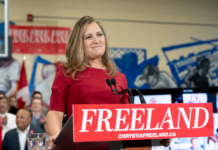A new Leger poll suggests that the vast majority of Canadians believe that the housing crisis and Canada’s crumbling health care system are being fuelled by high levels of immigration.
The poll was conducted between Friday and Sunday and found that 75% of respondents agreed that Canada’s high levels of immigration were adding pressure to the healthcare system and the housing market.
Additionally, almost two-thirds of respondents or 63%, said that the quantity of newcomers was an added strain on Canada’s education systems.
However, the poll also revealed that Canadians see some benefits to higher immigration as well, with about 75% saying that it contributed to the cultural diversity of Canada.
A majority of respondents, 63%, also said that they believe the arrival of young immigrants helps the workforce and contributes to the tax base, which in turn aids the older generations.
The poll was conducted online with a total of 1,529 respondents and therefore cannot be assigned a margin of error as online polls are not considered to be a truly random sample of the population.
The survey highlighted the current mixed emotions Canadians are feeling when it comes to the effects of immigration on the country.
As the country struggles with affordability and access to public services, there has been a shift in the public sentiment towards immigration.
Canada’s population grew by over a million people last year, including 607,782 non-permanent residents and 437,180 immigrants.
When compared to a similar Leger poll from March 2022, the number of Canadians who said they would like to see the country welcome more immigrants fell by 8%.
Conversely, more Canadians are now saying that the country should welcome fewer immigrants, with that number going from 39% to 48%.
More Canadians are beginning to connect problems like affordable housing to immigration, according to Leger’s executive vice-president Christian Borque.
“The makeup of the country, and the issues facing the country, are a bit different than they were before the pandemic,” said Bourque.
Ottawa has been under scrutiny over their rapidly increasing immigration targets in addition to the exponential amount of temporary residents.
Canada is on track to welcome 485,000 new permanent residents in 2024 and 500,000 in 2025. This number does not include temporary foreign workers, asylum seekers and international students.
Just over half of respondents, 53%, said that those numbers are too high, while 28% believed it to be the appropriate number. A small minority of respondents, 4%, said that Canada isn’t welcoming enough immigrants.
The Trudeau government has argued that raising immigration targets is necessary to fill the labour shortage demand due to an aging population.
They also allege that new immigrants can help build the homes that are needed to slow the housing crisis, however a recent study by the Fraser Institute revealed that immigration is a major driver of Canada’s housing gap.
This is in part due to the inability for the number of new homes being built stay ahead of the number of new people arriving in Canada.
Earlier this month, Immigration Minister Marc Miller tabled new targets in Parliament that called for the number of new permanent residents to remain at 500,00 in 2026.
Leger’s latest poll regarding federal voting intentions revealed that the Conservatives are holding a 14-point lead over the Liberals, with 40% of people saying that if an election were held tomorrow, they would vote for the Conservative party.
Another 26% of respondents said they would vote for the Liberals and 20% said they would vote for the NDP.
When respondents were asked if they were somewhat or very satisfied with Prime Minister Justin Trudeau’s government, only 29% said that they were.
When asked who would make the best prime minister, Poilievre came in the lead at 25% with Trudeau trailing behind him with 19% and Jagemeet Signh last with 17%.
Borque suggested that the lower support for leaders when compared to their parties may mean that for Canadians, the issue is more about leadership.
“We’re seeing that … all leaders are underperforming (their parties). Which begs the question: will this all be about leadership moving forward?” Borque told CTV News.





















